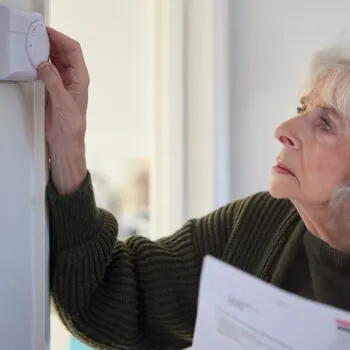Higher energy prices over the past four years have cost the UK £183bn, with government borrowing for support schemes adding and estimated £2.4bn a year in interest for 14 years.
Story
The UK’s dependency on fossil fuels has led to direct economic impacts of £183bn in the last four years following the Russian invasion of Ukraine, according to the latest assessment of the costs.[1] This is more than the £177bn that NHS England spent on health services in 2024/25.
The analysis, for the Energy and Climate Intelligence Unit (ECIU) and climate change think tank E3G, has investigated the direct costs of the energy crisis on households, businesses and the public sector, as well as the wider economic impacts.
Households have had to spend an extra £59 billion on gas, electricity and road fuels since 2021. For businesses and public sector bodies, the higher prices of gas and oil have increased energy bills by £65bn over the four years, taking the UK’s total extra energy costs to £124bn. Added to this is the cost of dealing with the bankruptcy of over 30 energy suppliers during the gas crisis which added around £4.5bn.
Government support schemes for energy bills totalled an additional £64bn, which is larger than the UK’s annual defence budget of £60bn. Borrowing to fund these support schemes is only partly offset by energy windfall levies that have raised £12.5bn to date, resulting in a net cost to the public finance of almost £55bn, with estimated interest payments of around £2.4bn due every year for 14 years, until 2037. These annual interest payments are equal to the annual cost of the School Rebuilding Programme, which aims to rebuild over 500 schools and colleges.
The findings come just before the Budget when the government is expected to introduce measures to reduce energy bills, with reports that the Chancellor is considering axing funding for insulation and clean technologies being widely criticised by civil society, unions and business who say it would increase fossil fuel dependency and fuel poverty and drive up energy bills in the long term.
Quotes
Jess Ralston, Energy Analyst at the Energy and Climate Intelligence Unit (ECIU), said:
“The shadow of the gas crisis is hanging over the budget with billions of pounds of interest owed on the government borrowing that was needed to subsidise household energy bills.
“Had insulation schemes not been cut over the past decade, many households could have fared so much better and the levels of energy bill debt many households and suppliers are lumbered with would not be nearly so bad. With rumours of cuts to the Warm Homes Plan and to support for electric heat pumps which represent the UK’s route out of dependence on the rollercoaster of gas prices, it’s important the lessons of the crisis are not forgotten.
“We know that more renewables on the grid can squeeze out gas and so bring down prices, but the historic lack of investment now needs to be reversed if we’re going to have a power system that can truly deliver energy independence.”
Ed Matthew, UK Director for E3G, said:
“The UK’s fossil fuel dependency has severely damaged the economy and been the main driver of the cost-of-living crisis. Fossil fuel companies have reaped billions in unearned profit whilst citizens have suffered skyrocketing energy bills, deepening energy debt and entrenching fuel poverty. It is essential that at the Budget the Chancellor protects insulation schemes and incentivises electrification to help the UK to take back control of its energy and permanently bring down bills. Clean energy offers a sanctuary for citizens from economic sabotage by dictators like Putin and exploitation by fossil fuel companies. All political parties need to decide whose side they are on.”
Key findings
The estimated direct costs for households due to energy and fuel prices, plus supplier bankruptcies, came to £63bn (2024 prices), an average of £2,200 per household. Total domestic energy debt and arrears are up 150% since late 2021, with both the number of households in debt and average debt values having risen sharply, and Ofgem stating in autumn 2025 that customer debt stands at £4.4bn.
Although the total direct cost to the UK of £183bn is spread across different sectors, for the purposes of illustration it equates to £6,400 per household (in 2024 prices), which is 10% more than the £5,800 average household spending on food and household energy in 2024/25.
The analysis found that, at the height of the cost-of-living crisis in late 2022, direct energy costs accounted for more than double the proportion of household expenditure than in mid-2021, rising from 4.8% to 10.2%. Direct energy costs were responsible for around a third of the cumulative inflation experienced by households from 2021 to 2023.
The report also examines the wider economic impacts of the fossil fuel crises, concluding that, whilst these impacts are too complex to be quantified accurately, the total cost to the UK will be far higher than the £183bn of direct costs.
Global energy prices began to spike in late 2021. Wholesale natural gas prices began rising sharply in summer 2021 as economies around the world rebounded rapidly from Covid lockdowns, and jumped higher following Russia’s invasion of Ukraine in early 2022. Gas prices in the UK peaked at record highs in late August that year as uncertainty around the future of the Baltic Nordstream pipelines rose, and remained volatile throughout 2023 and 2024.
Oil prices also responded to international demand and the Russian invasion of Ukraine, pushing up road transport fuel prices for around two years beginning in summer 2021, with inflation-adjusted pump prices for petrol and diesel not returning to pre-crisis averages until early-mid 2023.
For more information or for interview requests
Contact George Smeeton, Head of Communications, ECIU. Tel: +44 (0)7894 571 153; email: george.smeeton@eciu.net
Notes to editors
[1] The report, The Cost of the Fossil Fuel Crisis in the UK is available to download here.
Note that all values are stated in real terms (2024 prices) i.e. they have been adjusted for inflation and so differ from data sources that state values in nominal price (e.g. DESNZ’s DUKES datasets, Ofgem’s price cap data, etc.).
The Energy and Climate Intelligence Unit is a non-profit organisation supporting informed debate on energy and climate change issues in the UK. For more information or to receive our daily newsletter, please visit our website: http://eciu.net/
E3G is an independent think tank working to deliver a safe climate for all. We drive systemic action on climate by identifying barriers and constructing coalitions to advance the solutions needed. We create spaces for honest dialogue, and help guide governments, businesses and the public on how to deliver change at the pace the planet demands.


